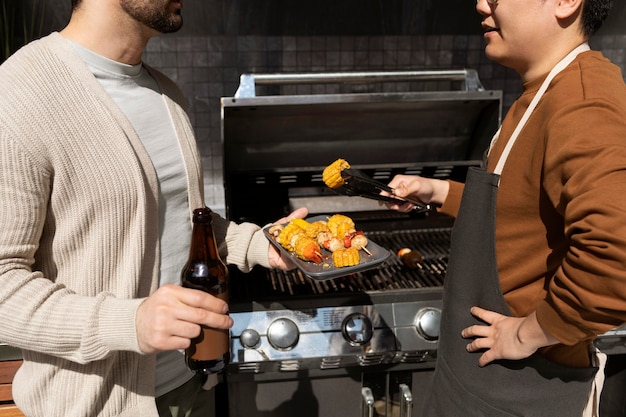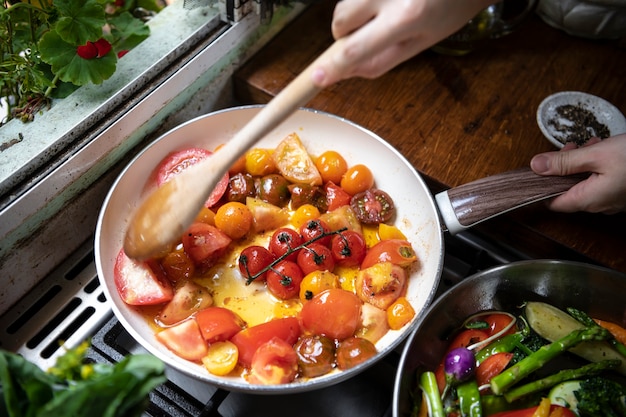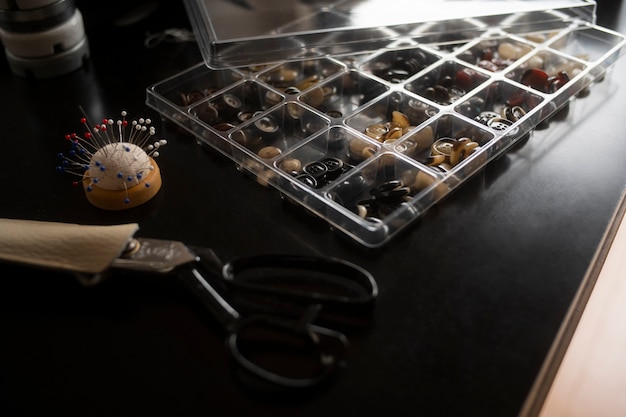Let's talk bratwurst, shall we? Those delicious german sausages, synonymous with lively beer gardens and hearty meals shared with good company. You can grill them, pan-fry them, even bake them, but today, we're diving into the magic of stovetop cooking.
Why stovetop? Simple! It's a breeze. You don't need fancy equipment, just a trusty pan and a bit of know-how. Plus, it gives you complete control over the cooking process. You can sear those bratwurst to perfection, achieving that irresistible crispy skin and a symphony of flavours that'll have your taste buds singing. And let's be honest, there's something truly satisfying about watching those sausages sizzle away, the aroma filling your kitchen, making you feel like you're part of a culinary ritual.
So, grab a beer (or a glass of something refreshing), put on your favourite tunes, and let's embark on this bratwurst journey together.
(Part 1) The Bratwurst Basics: Choosing Your Weapon

A World of Bratwurst
Bratwurst, my friends, is not a one-size-fits-all sausage. There's a whole spectrum of flavours and textures waiting to be explored. Here's a peek into the most popular varieties:
Nürnberger Bratwurst: These are the little guys, usually made with a blend of pork and veal. They're delicate in flavour and are traditionally served in sets of six, often accompanied by sauerkraut and mashed potatoes.
Thüringer Bratwurst: Think chunky and hearty. These sausages are typically made with pork, beef, and sometimes veal, often smoked for a smoky, almost bacon-like flavour.
Münchener Wei??wurst: The "white sausage," made with veal and pork, gets its pale colour from the addition of white pepper. It's traditionally enjoyed with sweet mustard for breakfast or brunch.
Frankfurter: A classic! This is the long, thin sausage you might be familiar with. They're made with pork, beef, and sometimes veal, boasting a mild flavour.
Choosing the Right Bratwurst for Stovetop Cooking
When you're cooking on the stovetop, you'll want a bratwurst that's not too thick or too long. Why? You want those sausages to cook evenly, achieving a crispy exterior while maintaining a juicy and tender interior.
For a beginner, I'd recommend starting with a Nürnberger or a Frankfurter. They're both relatively easy to cook and deliver delicious flavours that won't disappoint.
(Part 2) The Stovetop Showdown: Prepping Your Battlefield

Gather Your Gear:
A heavy-bottomed pan: A cast iron pan is the classic choice for cooking bratwurst, but a good stainless steel pan will do just fine.
A splatter screen: This is optional, but it's a lifesaver for keeping those hot oil splatters at bay.
A meat thermometer: Essential for ensuring your bratwurst is cooked through.
A spatula: For flipping those beauties.
A sharp knife: You'll want to make a couple of slits in the sausages before cooking. This will help them cook more evenly and release some of the fat.
Prepping the Sausages:
Let them come to room temperature: If your bratwurst are straight from the fridge, take them out about 30 minutes before you start cooking. This helps them cook more evenly.
Give them a little bath: Give those sausages a quick rinse under cold water. This helps remove any excess fat or debris.
Make some slits: Use a sharp knife to make a few shallow slits across the surface of each sausage. This will help them cook more evenly and release some of the fat.
(Part 3) The Art of the Sizzle: Cooking Your Bratwurst

Getting Started:
Heat your pan: Heat your pan over medium-high heat. You want it to be hot enough to sear the sausages but not so hot that they burn.
Add a bit of fat: You can use butter, olive oil, or even a combination of the two. Just make sure to use enough to coat the bottom of the pan.
Lay down your sausages: Carefully add your bratwurst to the pan, making sure they’re not overcrowded.
Let them sizzle: Cook for about 3-5 minutes per side, or until they’re golden brown and crispy.
The Crucial Flip:
Watch for those telltale signs: The bratwurst will start to release some fat and shrink a bit. When they’ve developed a nice crust on the first side, it’s time to flip.
Flip with care: Use a spatula to gently flip the bratwurst. Be careful not to tear the skin.
Cooking to Perfection:
Keep an eye on the internal temperature: You want to cook the bratwurst to an internal temperature of 155°F (68°C). To make sure they’re cooked through, use a meat thermometer to check the internal temperature.
Add some flavour: You can add a few tablespoons of beer or broth to the pan during the last few minutes of cooking. This will help create a delicious sauce.
(Part 4) The Grand Finale: Serving Your Masterpiece
side dish Symphony:
Classic German fare: Sauerkraut, potato salad, and pretzels are all excellent companions for bratwurst.
Think outside the box: You can also serve bratwurst with a side of roasted vegetables, a creamy mushroom sauce, or even a simple salad.
Don't forget the mustard: German mustard is the perfect accompaniment to bratwurst. Look for a variety that has a good balance of sweet and tangy flavours.
Plating with Panache:
A simple platter: Serve your bratwurst on a platter with your chosen side dishes.
Get creative with presentation: You can also serve bratwurst in bread rolls with some mustard and onions, or on skewers with roasted peppers and onions.
(Part 5) The Secret Sauce: Tips and Tricks
Use a good quality sausage: The key to a delicious bratwurst is using good quality sausage. Look for sausages that are made with fresh ingredients and are not overly processed.
Don’t overcrowd the pan: If you overcrowd the pan, the sausages will steam rather than sear, and they won't be as crispy.
Don’t pierce the skin: This will cause the sausage to lose its moisture.
Don’t overcook: Overcooked bratwurst will be dry and tough.
Get creative with flavours: You can add different herbs and spices to your bratwurst before cooking. Some popular choices include garlic, onion, paprika, and mustard seeds.
(Part 6) The Bratwurst Experiment: Exploring Different cooking styles
From Pan to Pot: A Stovetop Variation
The Method: Heat a pot of water to a simmer. Gently add the bratwurst to the pot and simmer for 10-15 minutes, or until cooked through.
The Benefit: This method will yield a more tender, juicy bratwurst.
Taking it to the Next Level:
Embrace the Beer Bath: Add a bottle of beer to your cooking pan for a richer, more complex flavour.
The Apple Cider Twist: For a sweeter, more nuanced flavour, try using apple cider instead of water.
(Part 7) The Bratwurst Blueprint: A Step-by-Step Guide
Here’s a simple step-by-step guide for cooking perfect bratwurst on the stovetop:
Ingredients:
1 lb (450 g) bratwurst sausages
1 tbsp butter
1 tbsp olive oil
1/4 cup beer or broth (optional)
Instructions:
1. Let the bratwurst come to room temperature.
2. Rinse the bratwurst under cold water and pat them dry.
3. Use a sharp knife to make a few shallow slits across the surface of each sausage.
4. Heat a heavy-bottomed pan over medium-high heat.
5. Add the butter and olive oil to the pan.
6. Carefully add the bratwurst to the pan, making sure they’re not overcrowded.
7. Cook for about 3-5 minutes per side, or until they’re golden brown and crispy.
8. Reduce the heat to low and add the beer or broth (if using).
9. Simmer for 5 minutes, or until the sausages are cooked through.
10. Use a meat thermometer to check the internal temperature (155°F/68°C).
11. Serve immediately with your favourite side dishes.
(Part 8) Beyond the Bratwurst: A culinary adventure
Bratwurst is a truly versatile sausage that can be enjoyed in a variety of ways. You can use them in pasta dishes, salads, and even pizzas.
Here are some ideas for experimenting with bratwurst beyond the stovetop:
Bratwurst Pasta: Slice the bratwurst and add them to your favourite pasta dish for a burst of flavour. Pair it with a creamy sauce for a comforting meal.
Bratwurst Salad: Chop up the bratwurst and add them to a salad for a hearty and delicious meal. Try a German potato salad with a tangy dressing, or a vibrant summer salad with fresh greens, tomatoes, and cucumbers.
Bratwurst Pizza: Top your pizza with bratwurst, onions, and peppers for a unique and tasty treat. Add a sprinkle of mozzarella and bake until the cheese is melted and bubbly.
(Part 9) The Bratwurst FAQs
Q: How do I know if my bratwurst are cooked through?
A: The best way to tell is to use a meat thermometer. You want the internal temperature to reach 155°F (68°C).
Q: What can I do if my bratwurst are too dry?
A: If your bratwurst are too dry, you can try adding some broth or beer to the pan during the last few minutes of cooking. This will help create a delicious sauce and rehydrate the sausages.
Q: Can I freeze bratwurst?
A: Yes, you can freeze bratwurst. To freeze them, wrap them tightly in plastic wrap or aluminum foil and place them in a freezer-safe bag. They can be frozen for up to 2-3 months.
Q: How long can I store cooked bratwurst in the refrigerator?
A: You can store cooked bratwurst in the refrigerator for up to 3 days.
Q: What are some good German mustard varieties to pair with bratwurst?
A: Some popular German mustard varieties include sweet mustard (sü??er Senf), Bavarian mustard (bayerischer Senf), and spicy mustard (scharfer Senf). Experiment with different varieties to find your favourite. You can also try a combination of sweet and spicy mustard for a unique flavour profile.
(Part 10) The Final Word: Bratwurst Mastery
Right, there you have it. The ultimate guide to cooking perfect bratwurst on the stovetop. Now you’re ready to impress your mates with your newfound skills. It’s all about patience, care, and a dash of culinary flair. But most importantly, have fun! The magic of bratwurst lies not just in the taste, but in the joy of sharing it with those you love.
So, gather your friends, crack open a beer, and let’s get sizzling!
Everyone is watching

Perfect Rice Every Time: The Ultimate Guide to Cooking Rice
Cooking TipsAs a self-proclaimed foodie, I've always been a bit obsessed with rice. It's the foundation of countless cuisi...

The Ultimate Guide to Cooking Asparagus: Tips, Techniques, and Recipes
Cooking TipsAsparagus. The mere mention of this spring delicacy conjures up images of vibrant green spears, crisp and burs...

Ultimate Guide to Cooking the Perfect Thanksgiving Turkey
Cooking TipsThanksgiving. Just the word conjures up images of overflowing tables laden with delicious food, the scent of r...

Prime Rib Roast Cooking Time Chart: Per Pound Guide
Cooking TipsPrime rib roast. Just the name conjures images of lavish dinners, crackling fires, and hearty laughter. It’s ...

Can You Cook Spaghetti with Gasoline? (The Shocking Truth)
Cooking TipsWe've all seen those crazy internet trends. You know, the ones that make you wonder, "Did someone actually try...
